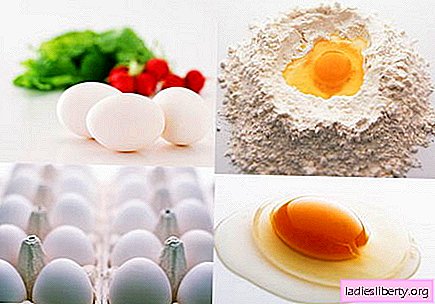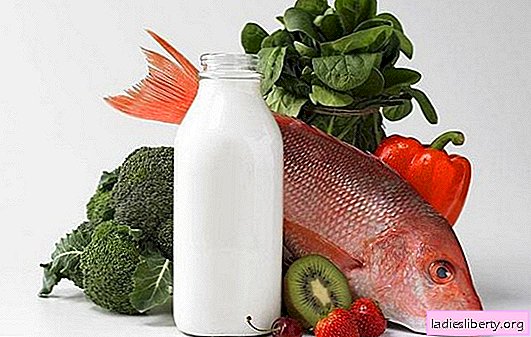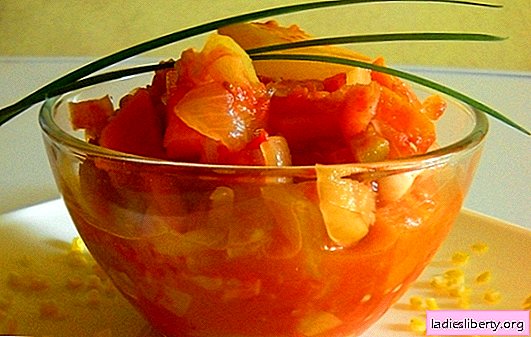
Egg Diet - Description and General Principles
Being slim is the goal of many girls. After all, a toned-up beautiful body is both health and the admiring glances of others. And if the weight does not reach the desired, then you can go on an egg diet. How is she good? Firstly, the eggs quickly saturate - you don’t have to feel hunger on an egg diet. Secondly, eggs are not a high-calorie product; approximately 80-100 kcal is contained in one egg. Thirdly, eggs are assimilated by the body by 98%; accordingly, no toxins will remain.
It is also worth noting that eggs are very healthy. Including them in the menu allows you to saturate the body with phosphorus, iron, calcium, potassium, manganese, zinc and other necessary trace elements, vitamins A, K, D, E, vitamins of group B. There are eggs and niacin in the composition, which provides brain nutrition.
However, the egg diet is not for those who are allergic to eggs. It also raises the level of "bad" cholesterol. In justification, we can say that egg cholesterol is the least harmful, since it enters the body along with lecithin.
Egg diet - what foods can I eat
The egg diet is quite democratic: you can eat many vegetables and fruits containing natural antioxidants, as well as plant fiber. Vegetables (with the exception of potatoes) should be boiled or fresh, but without oil. You can season them with seasonings, garlic, onions, a small amount of salt.
It is allowed to eat low-fat cheese (fat content not more than 17%), if desired, cheese can be replaced with low-fat cottage cheese. It is allowed to drink herbal or green tea.
In general, it is advisable to make your diet varied, then the egg diet will not become boring. It is advisable to alternate fruits - eat apples a day, pears the next day.
Egg diet - which foods should not be consumed
During the egg diet, you can not snack on fatty dishes, mayonnaise, fat sour cream, sausage and other high-calorie foods are excluded.
Of fruits you can not eat: mango, grapes, figs, dates and bananas.
There are several options for an egg diet, designed for different times. We give examples of the menu.
4 week egg diet
It allows you to lose weight by 7-10 kilograms. Moreover, the body during this time gets used to such a diet, so you can not only lose weight, but also maintain weight.
First week:
For breakfast daily: 2 eggs and 1/2 grapefruit (orange).
Monday
Lunch: one kind of fruit, in any quantity, but only on its own, for example, in any quantity of oranges. You can also watermelon, apples, apricots, pears, melons and more.
Dinner: boiled or fried meat.
Tuesday
Lunch: fried (boiled) chicken, which must first be removed from the skin.
Dinner: 2 soft-boiled eggs, salad (tomatoes, cucumber, pepper, carrots, salad), a quarter of a tortilla or toast, 1 grapefruit (orange).
Wednesday
Lunch: any amount of low-fat cheese, tomatoes, 1 toast.
Dinner: boiled (fried) meat.
Thursday
Lunch: in any quantity one kind of fruit.
Dinner: lettuce, boiled (fried) meat.
Friday
Lunch: 2 hard-boiled eggs, boiled vegetables (optional: zucchini, beans, green peas, carrots).
Dinner: fried (boiled) fish, lettuce, 1 grapefruit (orange).
Saturday
Lunch: in any quantity one kind of fruit.
Dinner: boiled (fried) meat, leaves of green salad.
Sunday
Lunch: boiled (fried) chicken without skin, boiled vegetables, tomatoes, 1 grapefruit (orange).
Dinner: boiled vegetables.
Second week:
For daily breakfast: 2 eggs, 1/2 grapefruit (orange).
Monday
Lunch: boiled (fried) meat, leaves of green salad.
Dinner: 2 hard-boiled eggs, lettuce, 1 grapefruit (orange).
Tuesday
Lunch: boiled (fried) meat, leaves of green salad.
Dinner: 2 hard-boiled eggs, 1 grapefruit (orange).
Wednesday
Lunch: boiled (fried) meat, cucumbers.
Dinner: 2 hard-boiled eggs, 1 grapefruit (orange).
Thursday
Lunch: 2 hard-boiled eggs, any amount of low-fat cheese, boiled vegetables.
Dinner: 2 hard-boiled eggs.
Friday
Lunch: fried (boiled) fish.
Dinner: 2 hard-boiled eggs.
Saturday
Lunch: boiled (fried) meat, tomatoes, 1 grapefruit (orange).
Dinner: fresh fruits (mandarin, orange, peach, melon, apple).
Sunday
Lunch: fried (boiled) chicken, which was previously skinned, boiled vegetables, tomatoes, 1 grapefruit (orange).
Dinner: fried (boiled) chicken, which was previously skinned, boiled vegetables, tomatoes, 1 grapefruit (orange).
Third week:
Monday
All day at any time in any quantity you can eat fruit, with the exception of grapes, dates, mangoes, figs and bananas.
Tuesday
All day you can eat any boiled vegetables, make any salads from them, you just need to exclude potatoes.
Wednesday
All day at any time any boiled vegetables, salads prepared from them are allowed, any fruits, except grapes, dates, mangoes, figs and bananas.
Thursday
In any quantity fried or boiled fish, boiled vegetables, in any quantity salad or cabbage.
Friday
Boiled vegetables, lean boiled (fried) meat, as an option, chicken.
Saturday and Sunday
All day in any quantity one type of fruit is allowed. Another day, a different view.
Fourth week:
Products are offered for the whole day, you can eat them at any time.
Monday
4 cucumbers, 3 tomatoes, 1 toast,
1/4 boiled chicken or 4 slices of boiled or fried meat,
1 can of tuna (washed with water or without oil),
1 grapefruit or orange.
Tuesday
4 cucumbers, 3 tomatoes, 1 toast,
2 slices of boiled (fried) meat (maximum quantity - 200 grams),
Pear or apple, or grapefruit, or orange, or 1 slice of melon.
Wednesday
a small plate with boiled vegetables,
1 spoon of any low fat white cheese or cottage cheese,
2 cucumbers, 2 tomatoes, 1 toast,
1 grapefruit or orange.
Thursday
cucumber, 3 tomatoes, 1 toast,
1/2 fried or boiled chicken,
1 grapefruit or orange.
Friday
3 tomatoes, 1 salad,
2 boiled eggs
1 orange or grapefruit.
Saturday
2 cucumbers, 2 tomatoes, 1 toast,
2 breasts of cooked chicken,
yogurt
1/8 kilogram of feta cheese or cottage cheese,
1 grapefruit or orange.
Sunday
2 cucumbers, 2 tomatoes, 1 toast,
a small plate with boiled vegetables,
without oil a can of tuna,
1 spoon of cottage cheese
1 grapefruit or orange.
2-week egg diet
This version of the egg diet provides meals 3 times a day - breakfast, then a second breakfast, as well as lunch. The last meal is no later than 18.00. Moreover, the effectiveness of the egg diet will depend on the rigor of its observance. You can’t exchange products for others; besides having a snack, it’s also impossible.
The first breakfast for two weeks is the same: 2 hard-boiled eggs, black coffee, grapefruit.
1 day
Second breakfast: tomato, 2 eggs, herbal tea.
Lunch: grapefruit, 2 hard-boiled eggs, herbal tea, vinaigrette without oil.
2 day
Lunch: 2 hard-boiled eggs, grapefruit.
Lunch: tomato, a dish of lean meat, salad, celery, cucumber.
3 day
Second breakfast: 2 hard-boiled eggs, tea, spinach.
Lunch: 2 hard-boiled eggs, cabbage, cottage cheese, herbal tea, beets.
4 day
Second breakfast: spinach, 2 hard-boiled eggs, coffee.
Lunch: fish, coffee, vinaigrette.
5 day
Second breakfast: spinach, 2 hard-boiled eggs, coffee.
Lunch: vinaigrette, fish, coffee, cabbage.
6 day
Lunch: any fruit salad.
Lunch: celery, beef steak, tomato, salad, coffee, cucumber.
7 day
Second breakfast: cold chicken, grapefruit, tomato.
Lunch: tomato, chicken, carrots, coffee, cabbage.
After this, the diet of the first week must be repeated.
Egg Orange Diet
The 5-day variant of such a diet is quite simple. For breakfast, as well as for lunch and dinner, you should eat 2 eggs and 3 oranges. If you strictly follow these recommendations, you can lose 3 kilograms. And you need to start eating oranges first - these fruits are able to narrow the stomach. Then they eat eggs - they fill the stomach with fiber. You can drink green tea.
Egg Diet - Useful Tips and Reviews
1. Eggs will be absorbed completely faster (an hour or two) if soft-boiled.
2. Drink should be clean water 1.5-2 liters, you can replace the water with green tea. For the sake of variety, you can occasionally drink coffee or black tea without sugar.
3. If constipation occurs, add more fresh vegetables to the diet.
4. In an extreme case, when the eggs get bored, they can be replaced with low-fat cottage cheese.
5. If there is a famine in the diet option, designed for 4 weeks, it is allowed to have a snack with lettuce or fresh cucumber.
6. Meat can be eaten any non-greasy, with the exception of lamb.
7. From the egg diet you need to exit correctly. In particular, limit sweat to foods that contain refined sugar. Do not also abruptly refuse eggs.
8. Do not stick to the egg diet for those who are allergic to eggs or have chronic diseases, in particular, the heart, kidneys, blood vessels.
Comments
how to fry meat











